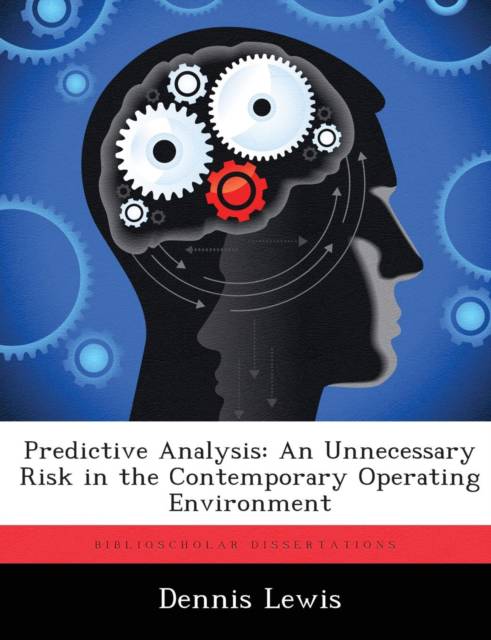
- Afhalen na 1 uur in een winkel met voorraad
- Gratis thuislevering in België vanaf € 30
- Ruim aanbod met 7 miljoen producten
- Afhalen na 1 uur in een winkel met voorraad
- Gratis thuislevering in België vanaf € 30
- Ruim aanbod met 7 miljoen producten
Zoeken
Predictive Analysis
An Unnecessary Risk in the Contemporary Operating Environment
Dennis Lewis
Paperback | Engels
€ 54,45
+ 108 punten
Omschrijving
The construct for predictive analysis is based on the unfounded assumption that technologies and sound analysis will dissipate uncertainty in war. U.S. military doctrine shows an expectation for prediction from the intelligence process; it assumes that prediction is possible, and details a methodology to achieve predictive results. However, this methodology is based on assumptions that presuppose an adversary with a developed doctrine or well-developed patterns of operation. Given that predictive analysis is based largely on knowledge of cyclical patterns in the form of doctrine or established procedures, current U.S. military analytical methods are at odds with the existing geo-political environment. Predictive analysis may still have its place - against a well-known, conventional peer competitor, or against a more unconventional foe who falls into recognizable patterns over time. Still, research suggests that predictive analysis is not feasible for operations in the COE due to the environment 's discontinuous nature, inherent unpredictability, and the resultant level of risk to the friendly force as adversaries make the attainment of surprise a priority. The U.S. military is in need of an alternative method of intelligence - one that does not rely on prediction (and its subsequent reactive approach and risk of surprise) but rather one that works within the realm of uncertainty and seeks to disable the enemy as an effective fighting organization, retaining initiative with the friendly force. Doctrine should give commanders and analysts the freedom to focus on enemy capabilities rather than intentions by removing the doctrinal requirement for prediction of enemy courses of action in probable order of adoption and developing a new intelligence methodology. A modified form of the descriptive method of analysis would be such a method, resolving the dichotomy between the unpredictable nature of the environment and the requirement for predictive results from intelligenc
Specificaties
Betrokkenen
- Auteur(s):
- Uitgeverij:
Inhoud
- Aantal bladzijden:
- 58
- Taal:
- Engels
Eigenschappen
- Productcode (EAN):
- 9781288306336
- Verschijningsdatum:
- 16/11/2012
- Uitvoering:
- Paperback
- Formaat:
- Trade paperback (VS)
- Afmetingen:
- 189 mm x 246 mm
- Gewicht:
- 122 g

Alleen bij Standaard Boekhandel
+ 108 punten op je klantenkaart van Standaard Boekhandel
Beoordelingen
We publiceren alleen reviews die voldoen aan de voorwaarden voor reviews. Bekijk onze voorwaarden voor reviews.











